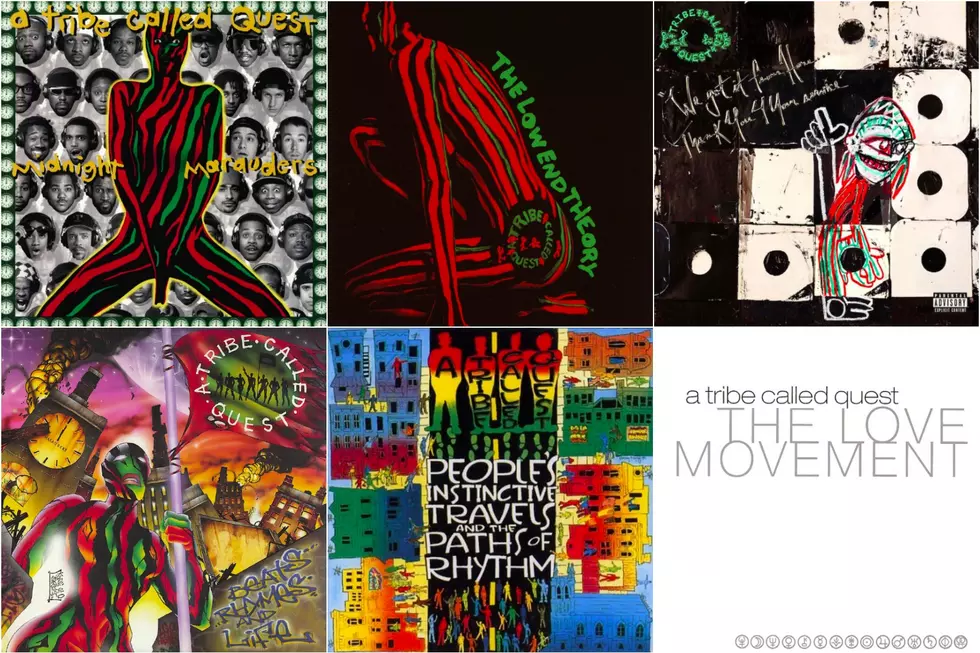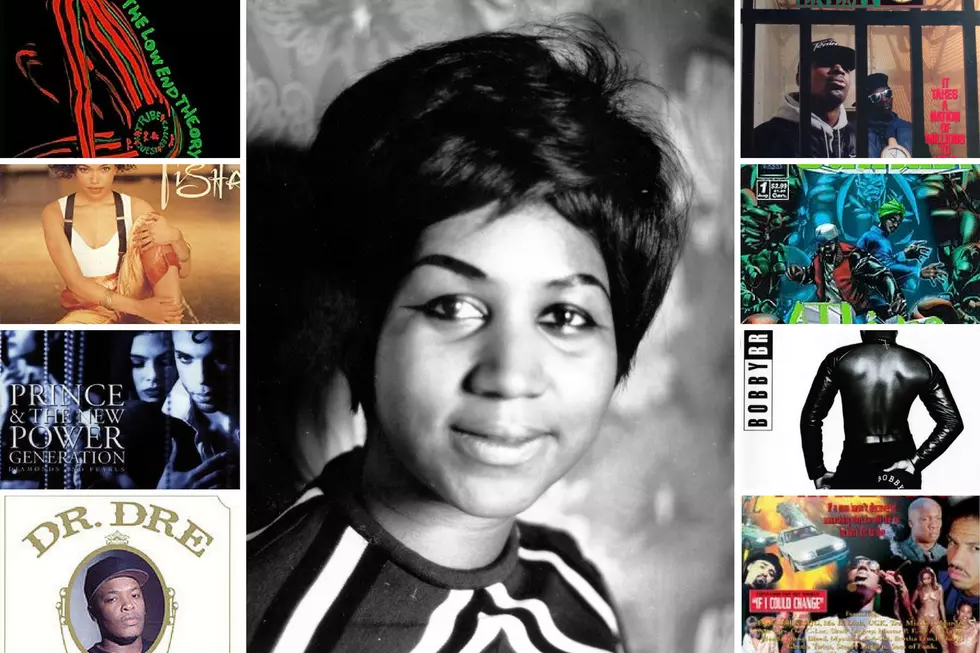
Why A Tribe Called Quest’s ‘Low End Theory’ Is Better Than ‘Midnight Marauders’
When people talk about A Tribe Called Quest's best album the general consensus is it's 1993's Midnight Marauders. But I always thought their most stellar body of work is actually their sophomore effort, 1991's Low End Theory.
I've had this argument about Low End and Midnight many times with many people, but one conversation that sticks out in particular is a three-hour debate with friends about which stands out more. And even though I've always thought Tribe's second LP wins the prize, my exact reasoning was formed on that day.
It was around 2004 or so, and Talib Kweli just finished lighting up the stage in Brooklyn's Fort Greene Park. As the crowd dispersed on to Dekalb Avenue, there was a feeling of electricity and a general hip-hop oneness in the air. Not only because the Black Star member ripped through crowd favorites like "Get By" and "The Blast," which we all sung along to, but he also brought Black Moon's Buckshot to the stage, who launched into a few classics of his own.
All and all, it was the perfect show, and my friends and I weren't ready to call it an evening just yet.
After the concert, we all headed to my apartment, which was right down the street from the park. On my living room wall I had — and still have today in my new spot — a bunch of classic hip-hop albums, and A Tribe Called Quest's Low End Theory hung in the center.
It's my favorite rap album for various reasons, and it's so important to me that I only play it once a year on my birthday. That way, I'm reminded of how special it is, and I never take it for granted it or overplay it.
When my friends entered the front door of my place, one of them said Midnight Marauders is Tribe's best album by far, and I should've put that cover on my wall instead.
My response? Although Midnight Marauders is almost just as dear to me, I feel Low End isn't only better, it's Tribe's highest musical achievement.
Low End is the album where everything came together for the group in terms of sound, and by the time they got to Midnight, their style and approach was already mastered. When the New York quartet dropped their classic 1990 debut, People's Instinctive Travels and the Paths of Rhythm, yes, their brilliance was evident but there were still parts of it that we hadn't seen yet. While the album spawned classic Tribe singles including "Bonita Applebum" and "Can I Kick It?" their brilliance had yet to be showcased in full.
The Tribe that we all know and love today—the one that's been written about and praised for nearly three decades—formed on Low End.
Although acts from Gang Starr to The Roots have been known for using jazz as a part of their sound, one could say that Tribe is considered the godfathers of that style, and it helped shape their legacy. The same couldn't be said before Low End existed.
Then there was Phife Dawg, who we heard on Instinctive and on the "Buddy" remix, but on Low End we were all invited to his lyrical coming out party, which again, gave us the version of Tribe that's beloved today. Songs like "Buggin' Out," "Show Business" and "Scenario" showed us just how skilled the Five Foot Assassin was. Plus, who can deny how visual and well-written "Buddy" is?
Even Q-Tip admitted that Low End Theory is their most accomplished album in Brian Coleman's brilliant book, Check The Technique, which breaks down the LP and other classic releases.
"A lot of our albums have been ahead of their time, including our first and third records," Tip says in the book. "But I think that Low End Theory was one of the most on-time records we ever did. At that time, it really broke us out of the Native Tongues stereotype, and it made people take us very, very seriously, especially after they had heard a [comical] song like 'I Left My Wallet in El Segundo.'"
Without question, Tip revolutionized hip-hop production on Low End by layering his samples and putting emphasis on the lower sounds, hence the name of the album. This can be especially heard on tracks like "Excursions," "Rap Promoter" and "Buggin' Out."
"At the time, there were some things that were happening in hip-hop sonically that I wanted to expand on, especially with the bottom," Tip explained. "For example, I loved Public Enemy, but I felt that sometimes their mixes didn't have enough dynamics to them. All their sounds were on the same floor: Bass, drums, guitars. I wanted to stack things on different levels."
Bob Power, the legendary engineer who helped to make Low End and other Tribe albums so extraordinary, also spoke of the production on the album, and how it shifted rap forever.
"It was a record that changed the way that people thought about putting music together," he said in 2011. "Until that point, when people used samples on records, it was pretty much one loop that played throughout."
"With the Low End Theory and People's Instinctive Travels, to a lesser extent, Q-Tip and Ali Shaheed were at the leading edge of a new wave where people started making elaborate musical constructions out of samples from different places that would not, and in many ways could not, have been played by regular players," added Power.
Another reason why Low End Theory stands out a little more than Midnight is because it was more ambitious for the group to put together. To put it differently, the sonic leap they made from Low End to Midnight wasn't nearly as big as the one they made from Instinctive to Low End.
One could say that it was easier for Tribe to make songs like "Award Tour" and "We Can Get Down" on Midnight after they made cuts like "Check The Rhime" and "Jazz" on Low End.
During that dope conversation in my Brooklyn apartment, I also brought up OutKast and said their third release Aquemini did for them what Low End did for Tribe. The way I see it, it's the LP the group seemed to find themselves on and carve out their individual roles.
Before Aquemini, Big Boi's player role wasn't fully developed on record yet, nor was Andre 3000's poet character, so it seemed they embraced their strengths on that album most.
In the end, did I successfully convince my friends that Low End Theory is better than Midnight Marauders that day in my apartment? No, not at all. But it was fun going to bat for an album that I consider to be hip-hop's best.
Low End Theory was genre bending, and Tribe's sound at the time seemed to come out of nowhere. On top of that, the sound on Midnight seemed to be more expected, even though its practically flawless and means almost just as much to me.
So if an album shifts how rap music is produced, has all those classic songs and its the release that gave us Tribe as we know them today, wouldn't those things make it their best LP? I think so, and it would be darn near impossible to convince me otherwise.
The 25 Greatest Rap Albums of 1991
More From TheBoombox









